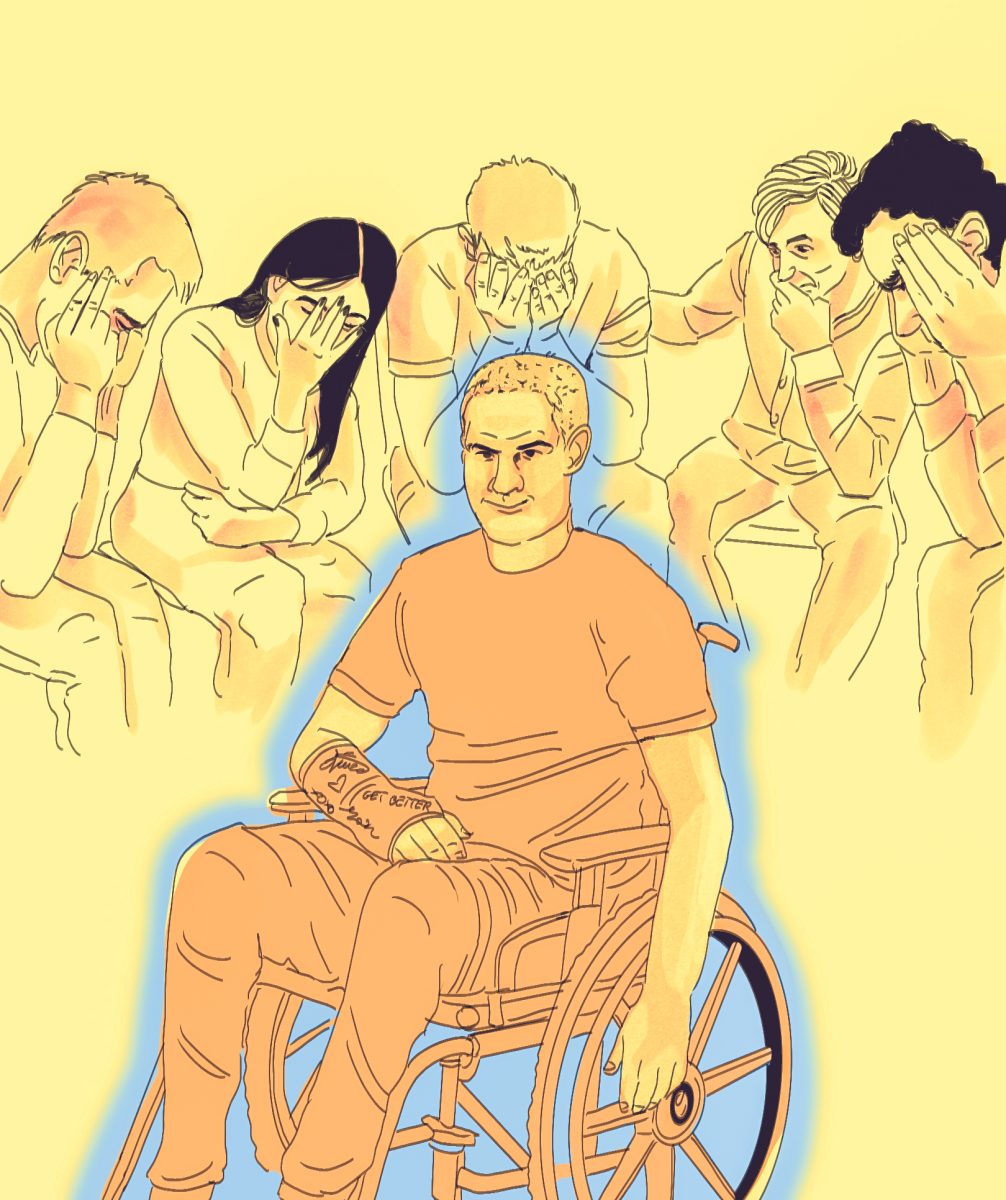First, it was a fatal genetic disorder. Then a paralyzing fungal infection from a rare Canadian mushroom. Finally, on the day that UMass Boston student Mitch Tomathan rolled his wheelchair into calculus class with a shaved head, it appeared his condition had progressed into some form of cancer.
However, when asked by his worried classmates what type of cancer was plaguing him, Mitch nervously stared down at the white, ill-fitting cast on his left arm and replied, “Uh, arm cancer?” He then proceeded to hand a classmate a Sharpie marker.
Mitch is what some would consider a New Millennium jokester, a product of our modern-day internet prank culture who’s made it his life’s mission to generate as much attention as possible at the expense of civilians’ sanity and respectable comedy. In his hometown of Weymouth, Mass., Mitch was the village idiot. Over the years, he’s documented his many practical gags on his YouTube channel, “SprankMyShinyHeiny68” which, as of today, has a whopping 72 subscribers.
His most famous video is his classic, “cuss out an innocent elderly person enjoying their day in a public space” prank. Eventually, the police show up and Mitch cleverly decides to call the officer a “fat-lard sandwich” before running away, getting tasered and being detained.
Upon making it to college, Mitch figured that it was about time he used his pranking powers to his advantage. This is when he concocted a wild scheme to get an extension on a calculus exam, and if his plan worked, it would go down—at least in his mind—as the prank of the century.
On the day of the exam, which just so happened to coincide with April Fools, Mitch sent his professor a carefully worded email explaining how he had been unable to adequately prepare for the test due to recently being diagnosed with a terminal illness. While Mitch’s excuse worked as well as he expected, what he did not expect was that his professor would show genuine care and concern for his health. And it wasn’t just his professor.
When word of Mitch’s grave condition got out, his classmates were quick to send their condolences. He received flowers, cards and even the opportunity to cook arugula pesto frittatas over Zoom with Martha Stewart, an event set up by UMass Boston with help from the Make-A-Wish Foundation.
Never in his life had Mitch experienced such sympathy. Normally, people seemed to hate him, whether it be for his obnoxious pranks or his overall douchebag attitude, but now? People were clambering for a chance to be a part of the pity party, and as the deathday boy, Mitch was lapping it all up like a marooned sailor suffering from dehydration and scurvy.
Giving himself a generous five years to live, Mitch planned on completing his bachelor’s degree and moving quietly to a cabin in the far North of Alaska where he’d change his name to Buck Sawtooth and live off the fat of the land.
However, before Mitch could put money down on some Yukon real estate, his calculus professor made a startling announcement: She had developed a new, experimental treatment that could potentially cure Mitch’s disease. But first, Mitch would need to be screened to determine what specific ailment he was suffering from.
“How quickly can one contract cancer?” asked a worried Mitch as he rolled his wheelchair into the professor’s campus laboratory. Surrounded by friends and family, Mitch was hooked up to an elaborate array of machines.
After running a series of EKGs, performing multiple CT scans and drawing a sample of his bone marrow, the results were conclusive. Mitch was in the early stages of amyloidosis, a rare disease that causes a buildup of the protein amyloid that can inhibit organ function and lead to death. As Mitch stared around the room in shocked horror, the professor solemnly informed him that he had about four to five years to live.
What had initially been a prank somehow became his reality, but before Mitch could grow too fearful over his diagnosis, the room burst into hysterics. It had all been one big joke, and Mitch was the butt of it. His calculus professor saw right through his lie from the get-go and got his entire class and family involved to reverse the prank and act as an intervention. And as Mitch left the laboratory with his loved ones vowing to “never prank again,” it seemed the intervention was a success.
However, after everyone left, I noticed the professor was still smiling. More of a smirk, actually, and a devious one at that.
“I’m sorry, am I not getting the joke?” I asked her. She turned to me, letting a little giggle slip through her teeth.
“Oh, you’ll get it in four to five years.”

